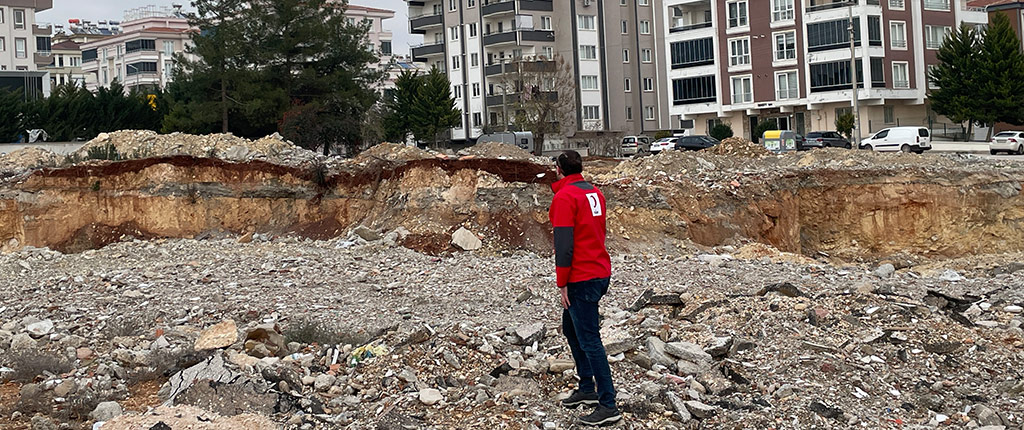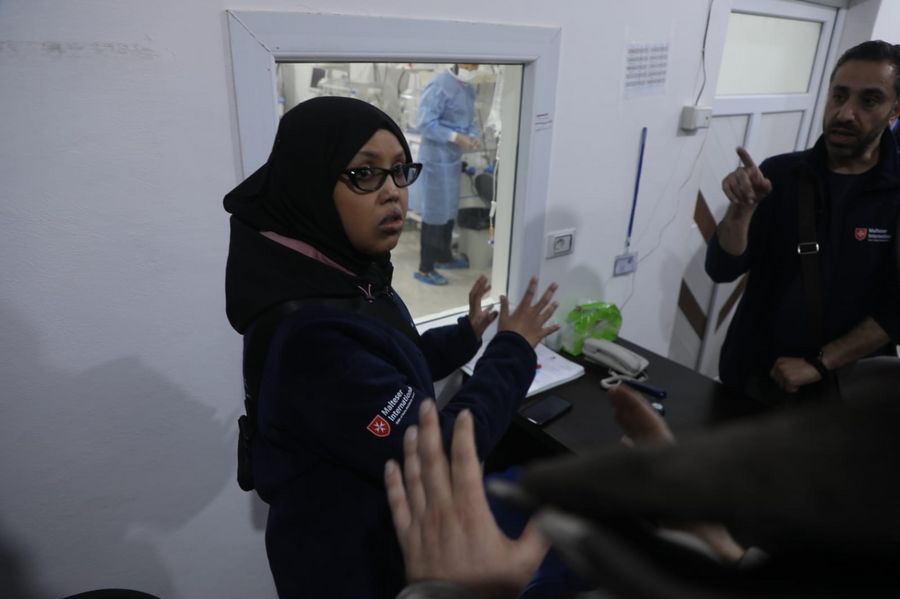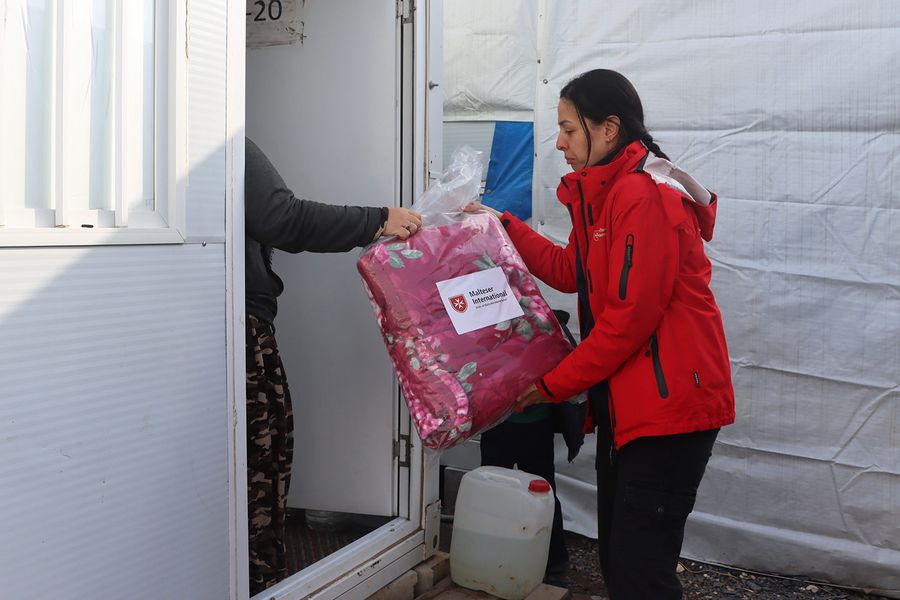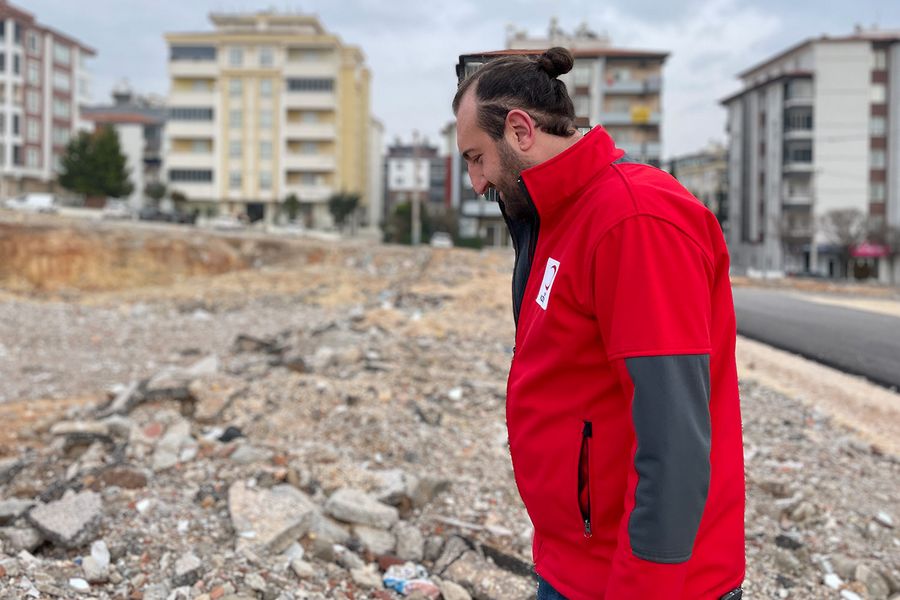
When aid workers become affected - Humanitarian aid workers report on the earthquake
Among the millions of people affected by the earthquakes in Türkiye and Syria in February 2023 were also the employees of the aid organizations working in the border region mainly to support Syrian refugees on both sides. For most of them, it was the first time that they were themselves caught in the middle of such a natural disaster instead of arriving in the aftermath to support the affected population. However, they had almost no time to process their experiences, as all of them felt the call to action in their hearts and immediately after the earthquake started looking after the people who had lost their homes and loved ones.
“At first I thought I was being attacked.”

Najad Sheikh was based in Gaziantep, Türkiye, during the earthquake and at the time working for UNICEF. Since last summer, she has been country coordinator for Malteser International:
"At first I thought I was being attacked. It was the middle of the night, my bed was shaking, and I thought ‘Who’s shaking my bed?’ Then I understood that it was an earthquake. I had experienced an earthquake before as a child, but never one like this. I had seen a war in my home country of Somalia as a child. But nothing like this earthquake. I just thought 'Dear God, don't let me die alone, let me see my family one more time'. Then I sought safety in a door frame. When the earthquake was over, I looked outside. People were running across the streets screaming. There was a freezing rain, it was bitterly cold. I got dressed and a driver came to drop me at the UNICEF office, where I was working at the time. I had believed I was here to provide emergency aid for the people in Syria. But suddenly I was part of this emergency aid myself and didn't know how to deal with it. I started calling our colleagues in Syria, asking them how they were doing and if they were able to work. And from then on, I worked for four days straight. I slept in the office with the other employees and worked virtually around the clock. There was no time to deal with my own trauma."
“Miraculously, my mother, my sister and my niece survived.”

Hayriye Yalim has been working for us since 2016. At the time of the earthquake, she was a program coordinator in our office in Gaziantep:
"I can't remember much of what happened immediately during the earthquake. It's just gone, suppressed. I was in Gaziantep with my husband, and I do remember that it was clear to us from the first moment that if we felt the earthquake so strongly here, then it would be devastating in my hometown of Antakya (Editor's note: Antakya is particularly vulnerable due to its geographical location). At once, we got in the car to drive to my parents, but, naturally, there was chaos on the roads. We were stuck in traffic for hours until we reached my parents' house. Miraculously, my mother, my sister and my niece survived. But my father remained under the rubble. We hoped for four days that he would be rescued alive. But on Thursday he was recovered dead from the ruins of my parents’ house. I love my husband, but my father was my first great love. I miss him very much. We buried him the same day.
After he was buried, I thought: okay, you are a humanitarian aid worker, now you have to rethink. And then my colleagues from Malteser International in Cologne arrived. And I thought: “This is my family.” And I said: “How can I help?” And then I started to work again. Through our aid work, I could dampen my own suffering. By saying “Let's help the other people”, I was able to forget my pain. In the end, that was my personal form of therapy. I am only now starting to talk to my family about the earthquake. Very slowly. To this day, I am afraid that there will be another earthquake. Someone only needs to jiggle the table, and I get scared."
“After my wife was safe, I felt the responsibility in my heart: I have to do something.”

Mustafa Sengül was in Gaziantep during the earthquake, from where he coordinated Turkish Red Crecent’s work. A few days after the quake, he showed our emergency aid team the damage in the city and coordinated further cooperation between our organizations:
"During the earthquake night, I heard my father cry for the first time in my life. That moved me deeply. In the whole region, we had never experienced anything like that before. There was nothing we could do, except pray. My wife cried. It was my responsibility to protect my family, but there was nothing I could do. The quake lasted so long, longer than a minute. It felt endless. I thought the house was going to collapse. After ten minutes, we managed to get to safety in our car. My wife couldn't speak. She couldn't feel her tongue and wanted water. I gave her snow from the roadside, because we had no water. I have seen many disasters in Syria. But I never thought that something like this could happen to me. It was the worst night of my life.
An hour after the earthquake, after my wife was safe, I felt the responsibility in my heart: I have to do something. I told my family that the people who had been hit harder than us needed me now. I went to the office and started working. I didn't sleep for four days. There were people everywhere on the streets, crying, cold. They had run to the streets and into the freezing rain in their night clothes, straight out of bed. We distributed clothes, blankets, set up tents. I think if I hadn't been able to work during that time, I would have been worse off mentally. I now realized the immense difference between theory and practice. When the houses here collapsed and people stood outside crying, at first they didn't need soup or warm blankets. They asked: Where is my father? Where is my mother? But we are not trained to rescue people. I felt helpless. The rubble that can still be seen everywhere to this day always reminds me of that night.
The earthquake completely changed the way I look into the future. Before, I was thinking about a new apartment, a new car. I no longer do. Instead, I think about how I would have gone on living if my wife had died. Before the earthquake, we used to watch movies in the evening. We don't do that anymore. We sit together and talk. I listen to my father, my mother, my wife. Those are the really important things in life."
(Katharina Kiecol conducted the interviews in January 2024.)








